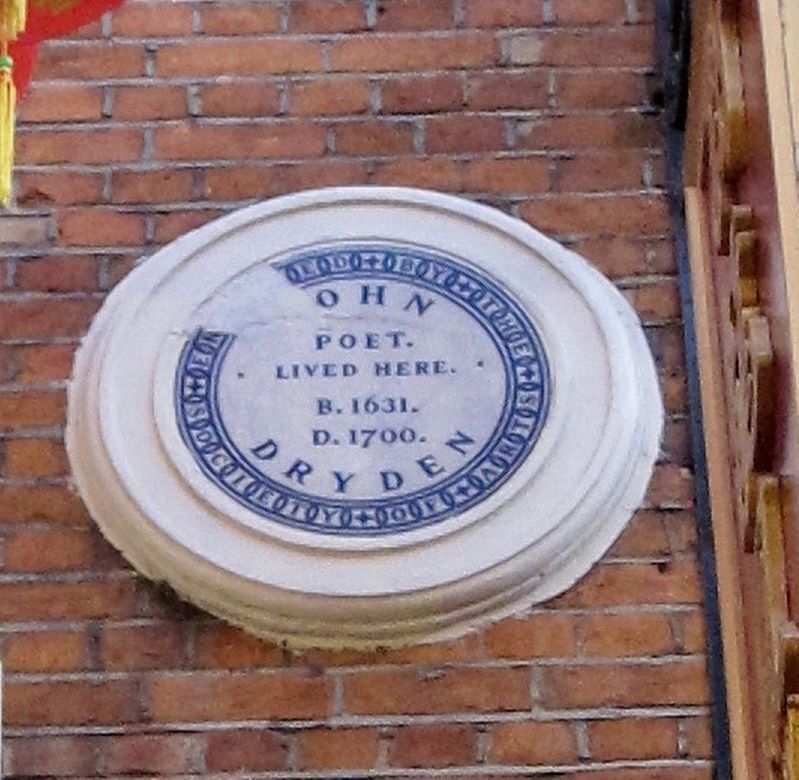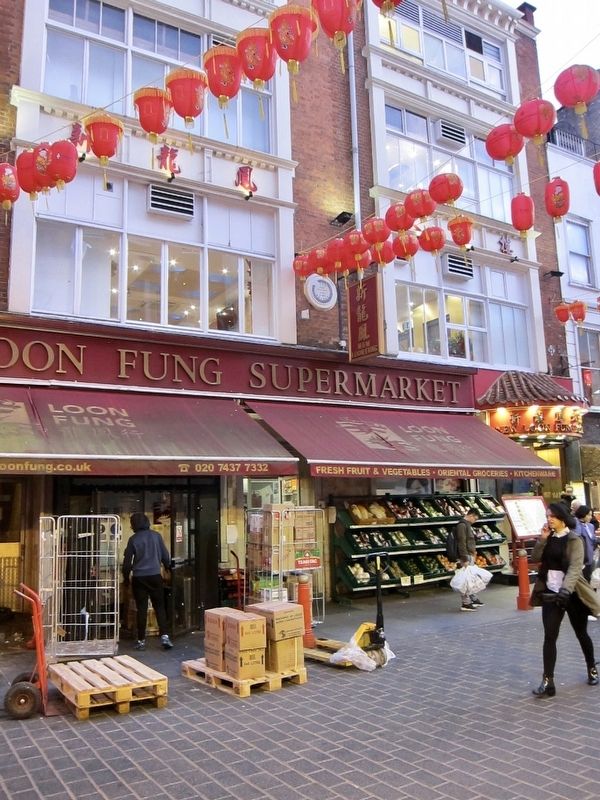City of Westminster in Greater London, England, United Kingdom — Northwestern Europe (the British Isles)
John Dryden
Poet.
Lived here.
B. 1631.
D. 1700.
Erected 1870 by Society of Arts.
Topics. This historical marker is listed in this topic list: Arts, Letters, Music. A significant historical date for this entry is May 12, 1700.
Location. 51° 30.72′ N, 0° 7.825′ W. Marker is in City of Westminster, England, in Greater London. Marker is on Gerrard Street just east of Macclesfield Street, on the right when traveling east. Touch for map. Marker is at or near this postal address: 43 Gerrard Street, City of Westminster, England W1D 5QG, United Kingdom. Touch for directions.
Other nearby markers. At least 8 other markers are within walking distance of this marker. The Club (a few steps from this marker); Penny Post (within shouting distance of this marker); Edmund Burke (within shouting distance of this marker); Mont Blanc Restaurant (within shouting distance of this marker); Pizza Express (about 150 meters away, measured in a direct line); Former Wardour Street Clubs (about 150 meters away); Frank Matcham (about 150 meters away); William Nicholson (about 150 meters away). Touch for a list and map of all markers in City of Westminster.
More about this marker. The English Heritage website indicates that the original building on which the plaque was mounted was demolished in 1901, and that the plaque was subsequently remounted on the new building. They also note, however, that subsequent research indicated that Dryden had actually resided at 44 Gerrard Street, not 43. English Heritage also notes that this plaque's blue-on-white color scheme is unique among the Society of Arts plaques (The Society of Arts is one of English Heritage's corporate predecessors with regards to the installment of Blue Plaques).
Also see . . .
1. John Dryden. "Dryden lived at 44 Gerrard Street with his wife Elizabeth (c. 1638–1714) from about 1687 until his death in 1700. His years there were difficult: his conversion to Catholicism in about 1685 meant that he was unable to take the oath of allegiance after the Glorious Revolution of 1688. As a result he lost his position as Poet Laureate, one he had held for 20 years. He found himself in financial difficulties but remained highly active in London’s literary world....Dryden usually worked in the front ground-floor room of the house, and it was here that he completed his last play, Love Triumphant (1694), the poem Alexander’s Feast, or, The Power of Musique (1697) and translations such as The Works of Virgil (1697). In the preface to the latter, Dryden likened himself to Virgil in his ‘Declining Years, struggling with Wants, oppress’d with Sickness’. " (Submitted on April 15, 2018.)
2. John Dryden (Wikipedia). "John Dryden (19 August [O.S. 9 August] 1631 – 12 May [O.S. 1 May] 1700) was an English poet, literary critic, translator, and playwright who was made England's first Poet Laureate in 1668....He is seen as dominating the literary life of Restoration England to such a point that the period came to be known in literary circles as the Age of Dryden. Walter Scott called him 'Glorious John'." (Submitted on April 15, 2018.)
Credits. This page was last revised on January 27, 2022. It was originally submitted on April 15, 2018, by Andrew Ruppenstein of Lamorinda, California. This page has been viewed 122 times since then and 17 times this year. Photos: 1, 2. submitted on April 15, 2018, by Andrew Ruppenstein of Lamorinda, California.

